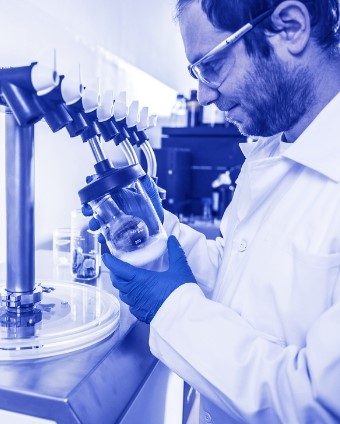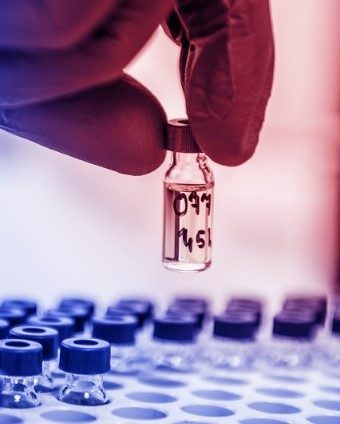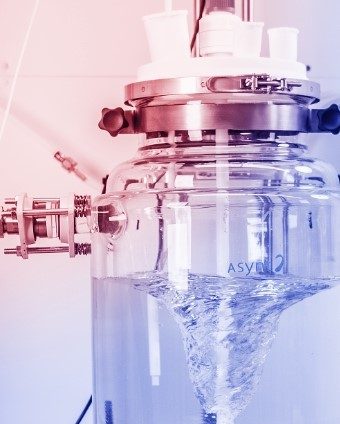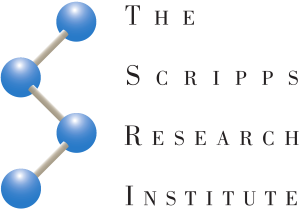Scale-up at Santiago Lab
Scale-up of organic reactions
At Santiago, we have broad experience with the scale-up of various processes. One of the projects we have been working on was purifying 350 kg of crude oil with an active ingredient. However, due to the low stability of the compound under UV light and alkaline conditions, the whole project had to be handled under extra protection protocol. We were proud of our work where we effectively managed to reduce the length of the entire purification process from days to hours and successfully refined 350 kg of oil altogether in just 14 days.

As you can imagine, transferring the synthesis of small molecules from mg scale to hundreds of g or kg is not a simple task. You cannot just take a bigger reaction flask and hope that the reaction will behave similarly. It is because processes that can easily be performed on a small scale in the lab simply do not work on a large scale without significant modification.
In this post, we briefly mention some of the aspects that you must keep in mind when trying to scale up your chemical synthesis.
Chemical point of view of scale-up
Very often, due to the limited amounts of chemicals or their price, or a complicated mixture of side products, the synthetic pathway that once worked on a small scale must be altered. At Santiago, we are always trying to find the best possible paths that would significantly limit the number of reaction steps or purifications, which can save a significant amount of time and, therefore, money.
Physical point of view of scale-up
Regarding physic laws, the most crucial factor that affects scale-up is the square-cube law. This law says that while the surface area increases as a square, the volume must go up as a cube (for illustration, we have added a table with typical values for a different type of scale). This affects the thermodynamic balance significantly during the reactions. More specifically, the rate at which heat can be added and, more crucially, removed during an exothermic reaction. This can lead to unwanted runaway reactions that may be very dangerous (not mentioning the cost of the chemicals) on a large scale.
| Reactor Volume (L) | Surface Area (m2) | SA/VR ratio (m2/L) | SA/V ratio (to 1 L reactor) | |
| Test-tube | 0,001 | 0,0004 | 0,407 | 9,3 |
| Laboratory | 1 | 0,044 | 0,044 | 1 |
| Kilo-lab | 10 | 0,209 | 0,021 | 0,48 |
| Pilot plant | 1000 | 4,75 | 0,0048 | 0,11 |
| Production | 10000 | 22,6 | 0,0026 | 0,05 |
Another vital aspect of scale-up reaction is mixing. Whereas you can easily stir small reactions with a magnetic stirrer bar, large scale reactions usually require a different type of stirring. Therefore, a mechanically-driven overhead stirrer is commonly used, and many times also various baffles must be added to the reactor to ensure proper mixing.

Work-up
Everything is more complicated on a bigger scale—even the most straightforward operation like aqueous work-up.
Let´s imagine that you have just finished a reaction on a 100 mg scale with some reagents that need to be removed by a standard aqueous work-up in the separation funnel. Usually, you do not think a lot about how much water you must add to ensure the proper removal of unwanted reagents. However, when you are scaling up the reaction and now doing it on a 50 or 100 g scale, you must be sure to add a sufficient amount of water to remove everything you do not want in your reaction mixture.
During some of our projects at Santiago lab, we have been dealing with undesired side reactions for quite a long time. In the end, we found out that this was caused by reagents from previous reaction steps that were not completely removed even after washing with more than 4 L of water in total (and of course, there were not visible on LC-MS nor NMR to complicate it properly).
Purification
Purification is another crucial factor during scale-up. Intermediates are usually purified by small silica columns or even on preparative TLCs (thin layer chromatography) for small-scale reactions. On the other hand, these efficient and easy purification techniques are challenging and expensive on a large scale. Sometimes there are even impossible to perform, just because a column so big that you need will cost more than the whole lab.
Due to these complications, some older techniques such as crystallisation or distillation are used during scale-up synthesis. Sometimes even the precipitation can help you and remove many unwanted side products.
Santiago lab and scale-up
At Santiago lab, we are ready to help you scale up your process or synthesise your desired products on a large scale.
We recently bought a brand new jacketed 20 L lab reactor from company ASYNT. This reactor, coupled with a temperature control system from JULABO, allows us to perform a big scale reaction in a wide range of temperatures (-45 °C – 200 °C).
In addition to a 20 L jacketed reactor, Santiago lab also possesses a 2.5 L stainless steel reactor for reactions under high pressure (such as hydrogenation).

For purifications, Santiago lab is equipped with fully automated flash chromatography systems of company ECOM s.r.o. These modern machines allow us to perform purification with columns from 4 g to 5 kg of silica or C18. This enables us to purify even complicated reaction mixtures up to 200 g.

You can see that at Santiago lab, we are ready to help you with a scale-up synthesis or custom synthesis. If you would like to know more, or we can help you with your research, write an email to Krystof Sigut on krystof.sigut@santiago-lab.com or reach him on the phone +420 776 750 591.
[vc_row][vc_column][insignia_section_heading title="Drop us a line" subtitle="We will respond as soon as possible, typically within 48 hours." align="text-center" c_margin_top="20" c_margin_bottom="20" add_icon="" font_weight="default" sub_font_weight="default"][contact-form-7 id="13965"][/vc_column][/vc_row][vc_row][vc_column][vc_empty_space height="80px"][/vc_column][/vc_row][vc_row][vc_column][vc_column_text][vc_row][vc_column width="1/1"][vc_column_text]
References:
N. G. Anderson, “Practical Process Research & Development,” 2nd Edition. Referencing press: 2012.
M. Butters et al., “Critical Assessment of Pharmaceutical Processes – A Rationale for Changing the Synthetic Route,” Chem. Rev., 106, 3002-3027 (2006).
C. Som et al., “ From laboratory to industrial scale: a scale-up framework for chemical processes in life cycle assessment studies,” J. Clean. Prod., 135, 1085-1097 (2016).
A. Shanley, “Scale-Up: Getting It Right the First Time," Pharmaceutical Technology, 43, 16-20 (2019).
J. B. Sperry et al., “Process Safety in the Pharmaceutical Industry—Part I: Thermal and Reaction Hazard Evaluation Processes and Techniques," Organic Process Research & Development, 24, 2529–2548 (2020).
OUR CASE STUDY
Scale-up to accelerate drug discovery
Our experience helped overcome development hurdles for potential cancer & mental health drugs.
Read moreEmpowering neuro research with pro-N6pA
Sigut Labs scaled up pro-N6pA production, simplifying AMPylation research & boosting accessibility.
Read moreADC development leaps with new linkers
Novel linker design expedited ADC advancement, leading to promising lead compounds faster.
Read moreLincomycin derivative scale-up
Over 30 g of the desired product with exceptional purity was obtained through our optimized procedure.
Read morePurifying 350 kg of vitamin K2 oil
Our innovative scale-up technology helped to reduce the client’s purification process from days to hours.
Read more
Custom synthesis
Providing for a custom synthesis of previously reported molecules using described synthetic procedures.

Contract research
Developing novel synthetic routes to provide undescribed compounds in organic, bioorganic, and medicinal chemistry.

Scale-Up
Helping you go from lab scales to an industrial scale by applying our cutting-edge instrumentation.

Our Experts


Partners & distributors











